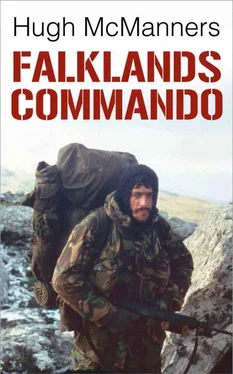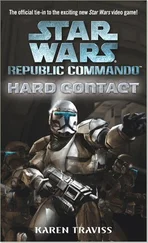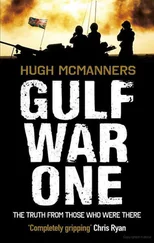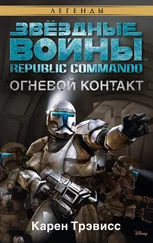Hugh McManners - Falklands Commando
Здесь есть возможность читать онлайн «Hugh McManners - Falklands Commando» весь текст электронной книги совершенно бесплатно (целиком полную версию без сокращений). В некоторых случаях можно слушать аудио, скачать через торрент в формате fb2 и присутствует краткое содержание. Город: London, Год выпуска: 2014, ISBN: 2014, Издательство: Nightstrike Publishing, Жанр: nonf_military, Биографии и Мемуары, на английском языке. Описание произведения, (предисловие) а так же отзывы посетителей доступны на портале библиотеки ЛибКат.
- Название:Falklands Commando
- Автор:
- Издательство:Nightstrike Publishing
- Жанр:
- Год:2014
- Город:London
- ISBN:978-0-992-81540-0
- Рейтинг книги:4 / 5. Голосов: 1
-
Избранное:Добавить в избранное
- Отзывы:
-
Ваша оценка:
- 80
- 1
- 2
- 3
- 4
- 5
Falklands Commando: краткое содержание, описание и аннотация
Предлагаем к чтению аннотацию, описание, краткое содержание или предисловие (зависит от того, что написал сам автор книги «Falklands Commando»). Если вы не нашли необходимую информацию о книге — напишите в комментариях, мы постараемся отыскать её.
Falklands Commando — читать онлайн бесплатно полную книгу (весь текст) целиком
Ниже представлен текст книги, разбитый по страницам. Система сохранения места последней прочитанной страницы, позволяет с удобством читать онлайн бесплатно книгу «Falklands Commando», без необходимости каждый раз заново искать на чём Вы остановились. Поставьте закладку, и сможете в любой момент перейти на страницу, на которой закончили чтение.
Интервал:
Закладка:
But I write this postscript just weeks after the appalling terrorist attacks of 11th September. The ‘baddies’ used smuggled craft knives with medieval barbarity, to force airline crews to ram skyscrapers, killing more ‘high-tech’ people than any previous terrorist attack in history. Predictably the US military relied yet again on its technology to bomb retribution upon Afghanistan. They look lucky – in that as I write, the Afghan leaders seem bent upon creating a stable country that will no longer give safe haven to terrorists.
It has become clear that behind all the President’s Texas tough talk of “smokin’ ’em out”, the US military had only the one card up their sleeve – as ever the laser guided bombs, missiles, and World War Two high-altitude carpet bombing as delivered by our old favourites the B52s.
But in reality however, air strikes can only be at best a catalyst for change. It was local opposition to the Taliban, empowered by the activities of SAS and US Special Forces on the ground, who did the fighting and achieved the result. [ 2014 note : but then of course the campaign dragged on for another thirteen years. So much for air power…]
We cannot rely on technology to save us from having to fight and if necessary die for what we believe in. I fear that the 21st century will provide our military people with plenty of opportunities.
Asymmetric warfare is now developing new and more terrifying ways of striking back at rich, high-tech nations – for which the USA is prime target. The economic grievances of the less developed world must become the prime concern of prosperous nations, even if the solutions mean we have to give things up. Their grievances fuel the anger and hatred that creates international terrorism; and only when they are assuaged, can many-headed monsters like Al Qaeda and Islamic Jihad , be strangled in their nests. It would be cheaper to bring trade and prosperity to the rest of the world, than to create the forces, doubtful security agencies, weapons and high tech solutions needed to fight an increasingly hopeless battle against fanatical enemies who are not going to go away.
Fighting a war against this ill-defined asymmetric enemy is very hard for the democracies, whose lawyers argue bitterly over anti-terror laws restricting civil rights, whose electorates will not tolerate military campaigns in which the body count grows too large. As we have already seen in the USA, the pressures on politicians to take revenge are enormous, even though this leads only to further terrorism. As I write, I am hoping that the USA and its allies will bring military-delivered aid to Afghanistan as part of the short term ‘revenge’ mission to arrest bin Laden – then continue providing aid as part of a long term, global strategy. [ 2014 note : instead they created Camp Bastion, a military town in the middle of nowhere, the size of Reading, and operations that cost far more than the expense of building a modern infrastructure that might create the sort of country-wide prosperity that might turn the people against the warlords.]
But just because we hand over billions of dollars in aid money, the terrorists themselves are not going to evaporate. They will continue operating, and as we have seen in Northern Ireland, positioning themselves so they can benefit financially, as local contractors or gangsters. Aid must be provided not as large cheques to line the pockets of government officials, but as well-organised, closely-supervised, long-term projects that will get the local economy creating wealth for itself and its people. And at the same time, the world’s police, military and secret service agencies must use the widest range of techniques and tactics to root out terrorists. Technology has its part to play, but success can only be achieved by putting men and women onto the ground, and the risking of lives. And as is obvious, they must be properly equipped – with clothing and equipment that takes advantage of the most up-to-date technology.
Britain’s armed forces are increasingly engaged in all manner of operations that are unpredictable and potentially very hazardous. They have also emerged from the most miserable period of moneysaving cuts, with the prospect of further serious budgetary difficulties not far over the horizon. Our Armed Forces are slimmed to the bone, with none of the slack needed either for formation training, or the unforeseen reinforcement of units already on operations. Service men and women are over-worked and morale is fragile.
Politicians and even some senior officers, resorting to self-congratulation to paper over cracks in the much presumed-upon morale of our armed forces, have correctly stated on various occasions, that our troops are the best in the world (a truth better left unsaid – at least by us, in my opinion…).
But as our politicians enjoy the reflected glory of hard-won military success, these same politicians, senior officers and civil servants ignore the bathos that could so easily overwhelm the people who actually have to do the work and take the risks.
MoD officials will doubtless cite the various reorganisations and improvements that they would argue make my criticisms outdated. I have not however mentioned the state of the Forces’ (particularly the Army’s) medical services. We could not go to war and expect to cope with any predicted level of casualties without seriously affecting Britain’s civilian National Health Service. General Sir Michael Rose, an SAS officer and Adjutant General (responsible for all personnel matters) who in Bosnia set much of the agenda for future military peace keeping operations, has already warned that though we assume our armed forces will continue to win wars, without radical changes (and more money), we must prepare ourselves for a serious military disaster, as our battle-winning troops cannot be expected to do it on their own indefinitely.
The SA-80 (L85A1) rifle saga is a typical and disgraceful example. Apart from boots, a soldiers’ rifle is his (or her) most important piece of equipment. Boots and rifle, the rock-bottom fundamentals of any armed force – or so you might think. (I will forego telling the equally disgraceful history of the British Army’s useless DMS boot.)
In the 1980s, many British soldiers wanted to use US-made M-16 rifles in preference to their heavy and mostly worn out SLRs, or the ineffective, old-fashioned and often dangerous SMGs, that were British Army standard issue personal weapons. I used the Colt Commando AR-15 variation of the M-16 during the Falklands War. An off-the-shelf buy of M-16s from the USA would have given us what we needed, and saved millions of pounds.
But to keep British arms manufacturing in business, the UK developed its own new rifle known as the SA-80 (of the NATO standard 5.56mm calibre, matching the M-16) at great cost. This took a very long time, and after the new weapon entered service, serious flaws were very quickly discovered. But presumably because it was hoped other countries might buy the new weapon, these flaws – a combination of fundamental design faults and shoddy manufacture – were ignored, despite well-informed and extensive media coverage of the problems.
Only when British troops went to war in the Gulf against Iraq and the media ran stories of SA-80 jamming in the desert sands, firing pins breaking and so on, was something done. At the same time, it was revealed that Britain’s much-vaunted new Challenger tank (another putative British defence industry money spinner) could not cope with desert conditions – the MoD had not bothered to purchase sand filters to protect Challengers’ engines.
Millions were spent investigating SA-80’s faults. Then in 2001, two decades after the SA-80 had been designed, and extensive modifications, the MoD announced that ‘exhaustive trials’ proved that SA-80 could finally be considered reliable. Fingers crossed, chaps – while the MoD’s procurement chiefs offer their most earnest thanks for the good fortune that kept British Army line regiments from being sent to war during all those years. (I’m joking – MoD procurement chiefs don’t actually care.)
Читать дальшеИнтервал:
Закладка:
Похожие книги на «Falklands Commando»
Представляем Вашему вниманию похожие книги на «Falklands Commando» списком для выбора. Мы отобрали схожую по названию и смыслу литературу в надежде предоставить читателям больше вариантов отыскать новые, интересные, ещё непрочитанные произведения.
Обсуждение, отзывы о книге «Falklands Commando» и просто собственные мнения читателей. Оставьте ваши комментарии, напишите, что Вы думаете о произведении, его смысле или главных героях. Укажите что конкретно понравилось, а что нет, и почему Вы так считаете.












